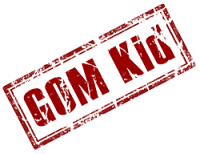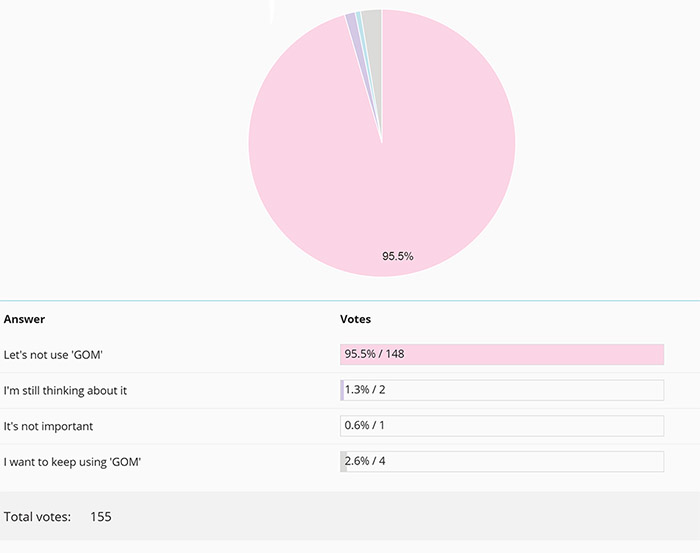 It started out as a neutral acronym, a convenient short form of Guardianship of the Minister, which made it’s way into common usage among professionals working with children in care. We polled professionals and the results are below.
It started out as a neutral acronym, a convenient short form of Guardianship of the Minister, which made it’s way into common usage among professionals working with children in care. We polled professionals and the results are below.
Young people in care have told us they don’t like it. They find it offensive for its negative connotations and prefer terms like ‘children in care’ or, more formally, ‘children under the guardianship of the Minister’.
In the words of a Youth Advisory Committee member in 2011…
It’s wrong to call someone a ‘GOM kid’… it’s offensive…no-one thinks good of you when they say ‘he’s a GOM kid’
For this reason alone we should stop using it.
But there are other reasons.
Language conditions our thinking. Acronyms routinely applied to a group of people can become dehumanising and so Australia’s First Peoples now, legitimately, dislike the use of ‘ATSI’. Up til the end of the last century ‘the disabled’ were a common subject of the discourse until we made the conscious mindshift that they were ‘people with disabilities’ – that is people first and foremost and not defined by a disability.
When ‘GOM’ comes from the lips of even the most well-meaning person or appears in the pages of the most high-minded document it falls like the thud of a stamp indelibly marking the subject as someone permanently defined and confined by a circumstance over which they have no control.
We could abolish this peculiarly South Australian term from our speech and writing at once with a minor effort of mindfulness. It would be one more step to reforming our habits of thinking, and the attitudes of the community, and remind them that, to us, they are children and young people first, last and always.
The results of a poll on whether we should use the term “GOM’ conducted between 14 and 20 June 2016 gave the following results:


11 Responses
I totally agree that GOM is offensive. Children in care have enough barriers to overcome and stereotypes attached to them, first and foremost they are children.
Young people themselves have said that they find the term offensive so their voice should be heard and this request respected.
Hello,
I had not heard of the term GOM kid until today. Don’t think that I have lived under a rock. Anyway, it is offensive and these children/young people already have more than enough to contend with.
Personally I find it hard to believe this term was used in the first place. For the most basic things like this to be overlooked during implementation shows the mindset of those responsible for the rights of these children. Even as an adult, how would one like to be referred to as a GOM? ”He/she’s a GOM… You’re a GOM.” How is one supposed to take that? It certainly doesn’t sound respectful does it?
While simple things like this are overlooked in the first place, it creates grave doubts whether those who hold the positions making these decision are truly acting in the best interests of the children?
I have always found the term ‘GOM’ or ‘GOM kid’ offensive. It is a bit like the way that we used to refer to people with disabilities by the name of the disability. I’m the sort of person who doesn’t like to use acronyms in any context, but using GOM as an adjective is particularly offensive.
It is easy to speak about what not to say. The trick is to give people the appropriate thing to say. I am not sure of the answer, a “supported student?” “Student with support?” I am sure great minds than mine could come up with an appropriate phrase talking to students who are represented in this group.
True Roy. The children who spoke to us didn’t seem to mind ‘under Guardianship’ when they had to be described. Students in care generally preferred not to be identified as such in the classroom at all for fear of being singled out or stigmatised. Some said that they were appreciative when teachers handled their guardianship status sensitively.
I asked our 12 yr old foster daughter how she felt about being referred to as a GOM18, she said she hates it & her friends that are also in care, hate it. Why? She said “why do adults always have to label people, my best friends is ASD, RAD, GOM18, we’re kids not items to be labelled”
The term GOM kid is not nice. Any foster kids living in my family are always referred to as my kids and are treated that way.
I agree that labels are usually problematic and often offensive. We tend to use them as shorthand, without due consideration of the consequences. Being defined by a condition, situation or a belief etc is usually unhelpful and limiting, partly because of the ‘baggage’ that accompany such labels. There is indeed language that could be used that would be more appropriate. That said, it seems worth bearing in mind that ANY language can be used derogatively; if delivered in a condescending tone when spoken. The key being to speak with respect for those we are speaking about.
The same applies to children referred to as NEPs. eg I have 3 NEPs in my class.